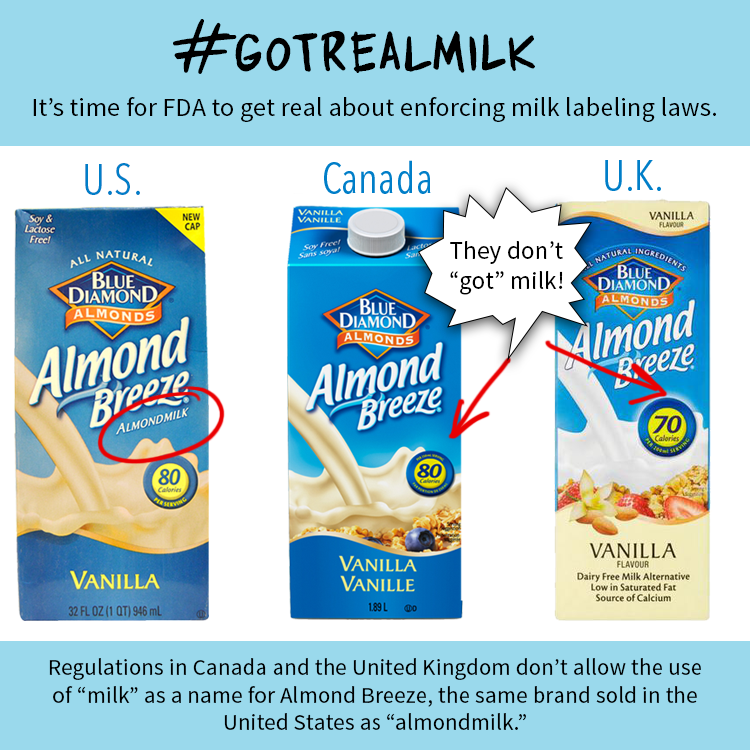Big Dairy scores major win over 'milk'
The U.S. Food and Drug Administration describes milk as the “lacteal secretion obtained by the complete milking of one or more healthy cows.” As non-dairy “milks” made of almond, hemp and flax proliferate the market, the agency has been lackadaisical about enforcing its own definition.
Now, the FDA plans to introduce regulations that would prevent manufacturers of plant- and nut-based beverages from using the word ‘milk’ to market their products, FDA Commissioner Scott Gottlieb said at a POLITICO conference this week.
“After years of inaction in response to our complaints about these labeling violations, Dr. Gottlieb’s announcement that the agency is intending to act on this issue is very encouraging,” said Jim Mulhern, president and CEO of National Milk Producers Federation, which represents the interests of 30,000 U.S. dairy farmers.
This battle comes as non-dairy alternatives are experiencing explosive growth in the U.S. Plant- and nut-based beverage sales soared 61% over the past five years and will reach $3 billion by 2020, according to market research firm Mintel. Fluid milk consumption per capita fell 9.7% over the same period, according to the U.S. Department of Agriculture.

Lawmakers, primarily from dairy-dominant districts, have been at the forefront of the movement. In January 2017, Sen. Tammy Baldwin (D-Wash.) introduced the DAIRY PRIDE Act, which “combats the unfair practice of mislabeling non-dairy products.”
In 2016, Rep. Mike Simpson (R-Idaho) and Rep. Peter Welch (D-Vermont) wrote a letter to the FDA, urging it to actually implement its own definition of “milk.” They were joined by 23 other members of Congress. California, Wisconsin, New York, Idaho and Texas are the states that produce the most milk.
The tensions within the dairy industry have escalated to President Trump’s Twitter feed, specifically in the context of trade with Canada. On Friday, he tweeted about Canada’s steep tariffs on U.S. dairy products. He first blamed the nation for the plight of American dairy farmers last April.
Canada has made business for our dairy farmers in Wisconsin and other border states very difficult. We will not stand for this. Watch!
— Donald J. Trump (@realDonaldTrump) April 25, 2017
Farmers have been on a downward trend for 15 years. The price of soybeans has fallen 50% since 5 years before the Election. A big reason is bad (terrible) Trade Deals with other countries. They put on massive Tariffs and Barriers. Canada charges 275% on Dairy. Farmers will WIN!
— Donald J. Trump (@realDonaldTrump) July 20, 2018
Milk’s halo effect?
While the fight over the word ‘milk’ seems to have hit a boiling point over the past few years, the dairy industry has been airing its grievances for decades. The NMPF first sent a letter to the FDA in February 2000 about the threat that “soy milk” presented to dairy farmers.
“We pointed out that if the FDA is passive and doesn’t do anything to stop soy-based beverage companies from using ‘dairy’ in their labeling, there will only be more products,” said NMPF Senior Vice President Chris Galen.
The popularity of non-dairy beverages has only skyrocketed since. In 2010, the industry group penned another letter to the FDA; this time, to express concern about almond and rice beverages in addition to plant-based yogurts. Now, upstarts are manufacturing “milks” made from hazelnut, potatoes, quinoa, macadamia nuts and everything in between.
“These products should be on the market. There’s nothing wrong with having competition between real milk and these upstart plant-based products. But competition implies rules,” said Galen. “There should be regulations. Then consumers can choose.”
“What we have seen is that milk definitely has a positive halo and that’s why it’s used. That’s the irony here — the term ‘beverage,’ ‘juice’ or ‘drink’ is more accurate but it doesn’t have the same halo effect as milk does,” he said.

The nutrition conversation
Some research suggests that a plant-based diet can decrease type 2 diabetes, help you stay at a healthy weight, and improve brain health. According to a study in JAMA Internal Medicine, eating more plant protein is associated with a lower risk of death.
The reality is that many opt for dairy-free products, not by choice, but out of necessity. Sixty-five percent of the human population has a reduced ability to digest lactose after infancy, according to the National Institutes of Health. Lactose intolerance in adults is most prevalent in people of East Asian descent, affecting upwards of 90% in some of these communities.
Galen, however, says the non-dairy alternatives don’t offer the calcium, potassium, vitamin D and protein that milk does. However, according to USDA’s own website choosemyplate.gov, suggested calcium choices for those who don’t consume dairy products include “almond milk” and “rice milk.”
Though the almond nut has a ton of protein, almond milk is not a great source of protein (1 cup has about 1g of protein) unlike cow’s milk (1 cup of 2% milk has about 8g of protein).
The model abroad
As more consumers have been grabbing a bottle of plant-based milk to drink at home, mega chains and restaurants are offering soy, almond, coconut and oat milks as staples.
In 2016, Starbucks (SBUX) introduced its own “almondmilk” (spelled as one word) as a non-dairy alternative. The chain first offered “soymilk” in 2004 and “coconutmilk” in 2015. Popular brands like Silk, Califia Farms and So Delicious have used the same one-word spelling for their non-dairy alternatives.
“The FDA is allowing that now, but it should be prevented. That would not be an acceptable outcome — removing a space and tacking another word onto milk,” said Galen.
Though non-dairy drink manufacturers in the U.S. are getting away with using “milk” in their labeling at home, they are playing by the rules abroad.

The timeline
While NMPF considers Gottlieb’s comments about cracking down on the non-milk industry a win, the next steps remain unclear.
Galen said he hopes that the same rules will apply to all dairy-based products, including yogurt, ice cream and butter.
Gottlieb said that the FDA will first gather public comment before implementing any regulation.
“This is going to take time. It’s not going to take two years, but it probably takes something close to a year to get to go through that process,” the commissioner said.
“The timeline is a little bit disappointing, although perhaps not surprising,” said Galen. “This has been very challenging and daunting to get any action by the FDA. Just the proclamation by the commissioner that they’ll be looking at this in the future is promising.”
Melody Hahm is a senior writer at Yahoo Finance, covering entrepreneurship, technology and real estate. Follow her on Twitter @melodyhahm.
Read more:
Shiller: The housing market has been overheated since 2012
Older millennials are leaving the city for a new kind of suburb
How Trump’s travel ban undermines a key U.S. export: education

 Yahoo Finance
Yahoo Finance 